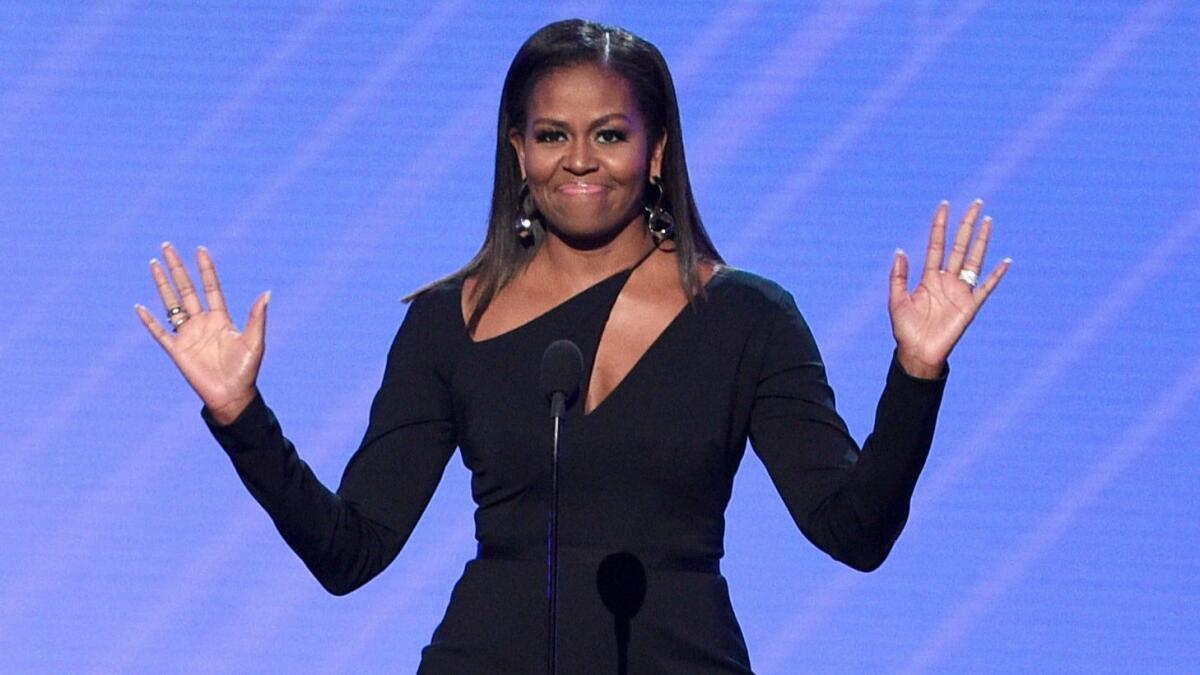Celebrating 25 years, the ESPYs have become more than a sports awards show

In 1993, ESPN broadcaster and big-league college basketball coach Jim Valvano brought a howling, teary-eyed Madison Square Garden to its feet with a heartrending speech at the inaugural ESPY Awards show.
A charismatic, sports-loving guy with a charming knack for candidness, Valvano — better known by his nickname, Jimmy V — accepted the show’s first-ever Arthur Ashe Courage and Humanitarian Award. That’s perhaps the ESPYs’ most distinguished accolade, which has recognized the likes of Muhammad Ali, Nelson Mandela and, more recently, Caitlyn Jenner.
While the award honored Valvano for his legendary coaching career, it also acknowledged the real courage required to fight a scrappy battle with a relentless class of bone cancer, which Valvano had begun the year before. Though his chipper spirit suggested otherwise, in 1993 he was in the thick of it.
Valvano’s illness inspired him to conceive of the V Foundation for Cancer Research, which he founded jointly with ESPN. During his ESPYs acceptance speech, Valvano shared the organization’s motto with his audience: “Don’t give up. Don’t ever give up.”
Valvano, who died less than two months later in April 1993, is memorialized in that speech, as well as in the ESPYs’ Jimmy V Perseverance Award. Not only has the V Foundation awarded more than $170 million in cancer research grants since its inception, but Valvano’s brave remarks set the tone for the ESPY Awards ever since.

Celebrating its 25th anniversary, Wednesday evening’s ESPY Awards show paid homage to Valvano’s legacy.
Though the evening was peppered with wisecracks — mostly at the hands of its host, beloved NFL superstar Peyton Manning — a heartfelt sincerity shaped the ceremony.
That’s nothing new for the ESPYs. Following their 1993 debut, the ESPYs have evolved beyond their roots in athletics. They’re now a forum for social and cultural conversations.
This year’s ESPY iteration paid tribute to the upcoming 50th anniversary of the Special Olympics, in large part, by spotlighting individuals with disabilities.
Because, as ESPYs executive producer Maura Mandt attests, inclusion is at the heart of the awards show.
“It’s all about unity,” she said. “It’s about bringing the community together.” As a young production assistant at the first show in 1993, Mandt thought Valvano’s speech was “incredibly inspiring.”
Much like their predecessors, the recipients of this year’s major ESPY accolades had inspirational stories of their own. And much to the chagrin of the audience’s tear ducts, Wednesday’s show gave them their due recognition.
The ESPYs’ most prestigious awards, which the show’s producers have come to regard as “pillars” of its character, have historically been platforms for social change.
In 1997, the ESPYs honored boxing champion Ali for his activism and courage to confront racial and religious prejudices. In 2014, it saluted NFL all-star Michael Sam, who became the first openly gay professional sports player earlier that year, for elevating LGBTQ visibility in pro sports. And that same year, it honored former Olympic champion Jenner for her advocacy work within the transgender community.
This year’s show posthumously honored Special Olympics founder Eunice Kennedy Shriver with the Arthur Ashe Courage Award, which former First Lady Michelle Obama presented in a moving speech; disabled veteran and Invictus Games gold medalist Israel Del Toro (a master sergeant in the U.S. Air Force) with the Pat Tillman Award for Service; and 15-year-old Jarrius “JJ” Robertson with the Jimmy V Award for Perseverance.
Robertson, dubbed the official “hype man” and “social media master” for the New Orleans Saints, has undergone two liver transplants and 13 surgeries in his lifelong battle with a chronic liver disease.
Robertson’s acceptance speech was another testament to his indomitable spirit — not to mention a testament to the ESPYs’ commitment to telling such important stories.
More to Read
The biggest entertainment stories
Get our big stories about Hollywood, film, television, music, arts, culture and more right in your inbox as soon as they publish.
You may occasionally receive promotional content from the Los Angeles Times.










